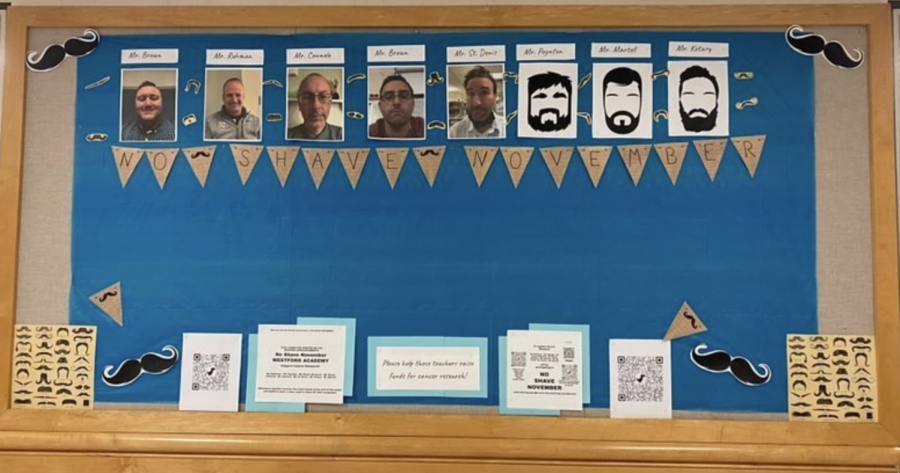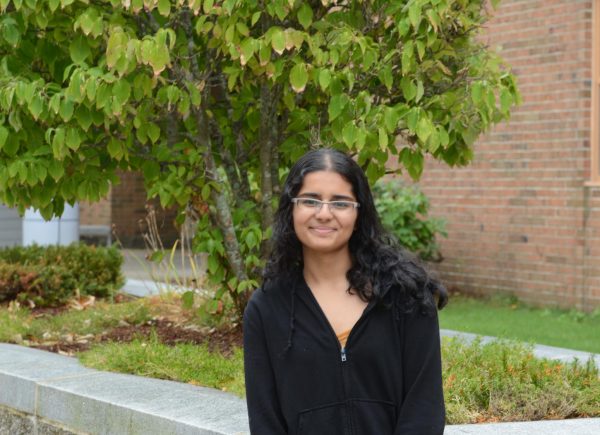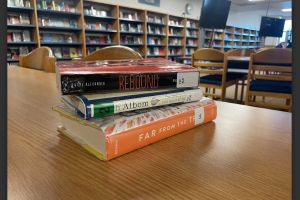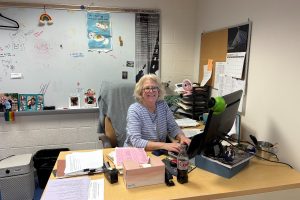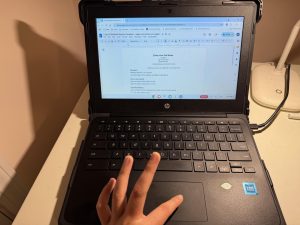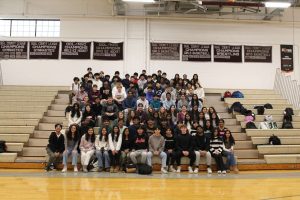Relay for Life brings No-Shave November to WA
A bulletin board displaying the 8 teachers that participated in No-Shave November.
December 3, 2021
Throughout November, eight male teachers put their razors to rest as part of their participation in WA’s first “No Shave November” contest, held by Relay for Life.
The teachers taking part were challenged to collect the most donations from students and the winning contestant will be required to reveal their newly grown beards. The contest is part of a larger movement called “Movember”, that takes place during the month to spark conversations about men’s health issues, including cancer awareness and suicide prevention.
With the final amounts counted on Tuesday, Nov. 30th, social studies teacher Chris Connole has been declared the winner, raising $117 of the total $225 accumulated. Spanish teacher Scott St. Denis came in second place, raising $60.
Though this is his first participation in the event, Connole expects to take part next November as well and continue raising awareness and funds to fight cancer.
“I want to shave this thing [my moustache] but [I joined] because it seemed kind of fun [and] it’s a good cause,” Connole said. “I think for me, on a more personal level, I lost my mom this past year. She battled breast cancer for 20 plus years. So I think it got a little personal for me. And I hope people keep that in mind. I mean, the money is going towards research for cancer and it’s amazing what they’re doing right now. As much as we can help and raise money, it’s completely worth it.”
Beyond the money collected or staches grown, events like this produce a wave of powerful conversations, bringing attention to personal stories by those affected by cancer. This is one of the many initiatives led by Relay for Life to raise money and awareness for cancer since the club’s return last year. The club has since raised a total of $5000 dollars, in collaboration with neighboring towns.
Senior Isha Macha, the co-president of Relay for Life, explained the inspiration behind bringing No-Shave November to WA.
“One of the main reasons we wanted to hold this event [No-Shave November] was to get engagement in the school,” Macha said. “Our main goal is just to allow young and old people, whoever it is, to empower cancer patients and survivors. Everything is going towards this and the fundraisers we hold […]. Holding No-Shave November was a fun way of getting the staff and students involved and supporting cancer.”
While No-Shave November had been a popular activity for years, it was given new meaning after the Hill family in Chicago re-invented it to raise funds for cancer charities in 2009. According to the Mathew Hill Foundation website the goal is to embrace facial hair, which many cancer patients lose, and donate the money and time typically spent on grooming products to cancer prevention and education.
At WA, this event has enabled Relay for Life to expand its reach, as the competitive and amusing nature of the event draws both teachers and students in. St. Denis, an advisor to the club, notes that a major goal is using this engagement to bring attention to early detection and getting information out to students, especially at a young age.
“I’m a cancer survivor of eight years. I kind of just went in for a physical and they found a lump in my neck. I hadn’t felt anything. So, it was just a complete happenstance of, ‘Hey, this thing doesn’t look right.’ And the one thing that caught me off guard, way back, was, you know, early detection is the reason I’m still alive,” St. Denis said. “The goal really is to just get people thinking about their own health. At a younger age, you often think you’re invincible for sure. And unfortunately, it’s not always the case […] I mean, I was diagnosed at age 32. You don’t often [consider] cancer on the younger side of things.”
While statistics may seem distant, the numbers are closer to life than most imagine. 1 in 8 men will be diagnosed with prostate cancer, and 1 in 41 will end up dying from it.
“It’s [cancer statistics] a huge percentage,” St-Denis said, “I think the first couple weeks we’ve done our job pretty well of getting this out there. People are talking about it now. [They’re asking] why is this happening? And it’s those kinds of numbers that we’re trying to put out there and bring to light.”
According to St Denis, Relay for Life had always been a club at WA but became less active throughout the years. As student engagement died down, the original club began to fade into the background and with COVID-19 prompting a virtual setting, the issue was further exacerbated. That is, until last year when a group of 5 current seniors were introduced to the cause and made it their mission to bring the club back to life. The members currently leading the club include Macha, Azkah Anjum (co-president), Shreya Navuduri (vice president), Urvi Sehgal (volunteer director), and Sindhu Anandaraj (secretary).
“When we heard about Relay for Life, from a former member at Acton, [..] the five of us were all just like, why don’t we start our own chapter? […] We thought it was a fun way to get the group involved and contribute to cancer patients.” Macha said. “We actually started small and [later] got 30 members involved last year. That was when we decided that this could really be a success to help patients across the nation.”
Prior to No-Shave November, the club has found success carrying out various fundraisers. From bake sales at the farmer’s market and smaller restaurant fundraisers to booths at football games and raffle basket giveaways, the team has made an impact on the community. United by a common purpose to fight against cancer, the club is supported by people of various personal backgrounds and stories.
“I think everyone’s probably been affected some way or another by cancer, whether it’s friends or close-knit family. So something that really brings our club together is the stories behind why we’re all participating,” Navuduri said.
Following the No-Shave November event, the club plans to coordinate various fundraisers and ceremonies for the spring and years ahead.
“In terms of awareness, every month is a new month for a different type of cancer. For example, last October was breast cancer awareness, and we held an event for that. We want to send the message that cancer won’t stop and neither will we,” Macha said.

